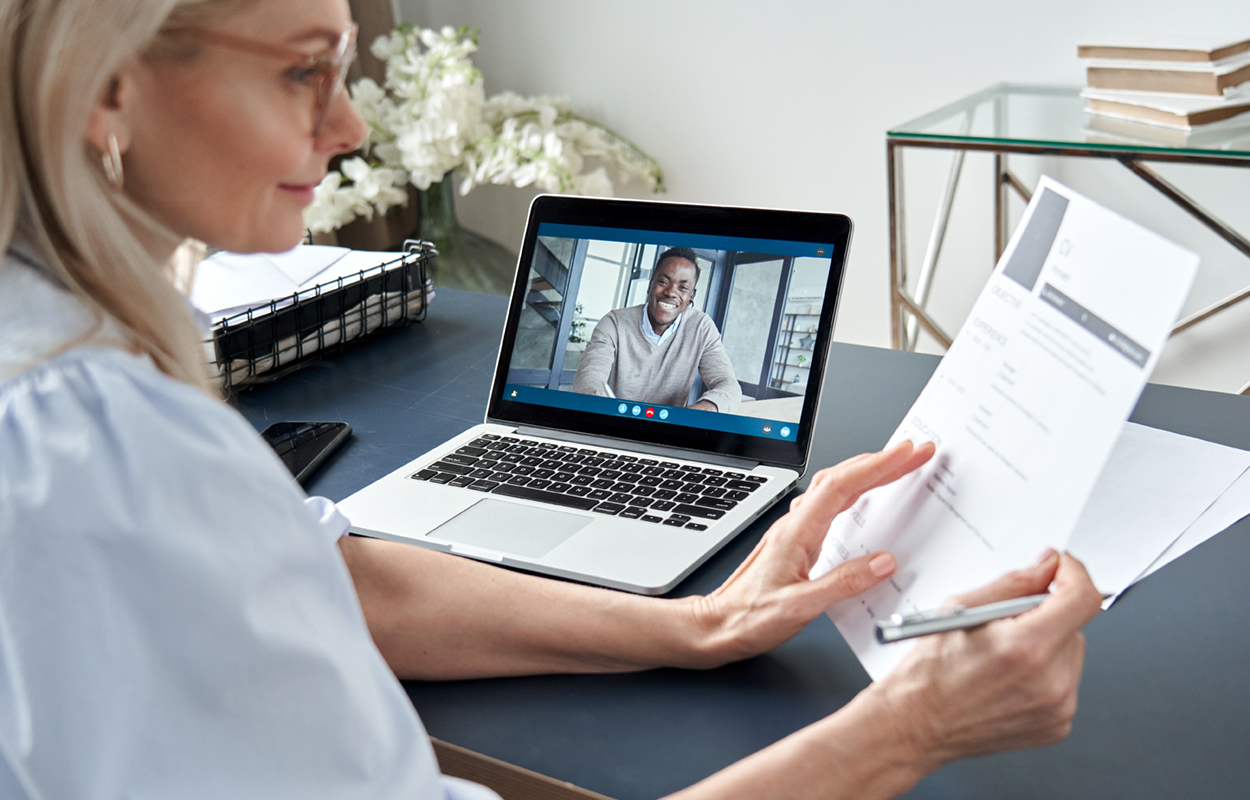In this lesson, you will learn about different interview styles and questions asked in interviews. Specifically, this lesson will cover:
1. Interview Styles
There are several different types of interview styles that can vary as widely as the company or interviewer that uses them. We will discuss three types: in-person, panel, and virtual. It’s important to remember that any in-person or virtual interview can be conducted by an individual or a panel. Regardless of the type of interview you will participate in, you should try to find out beforehand who is conducting the interview, and in what format, so that you can be prepared.
1a. In-Person Interviews

Interviews are traditionally conducted face-to-face with an employer. There are many benefits to a face-to-face interview. Being in the room with your potential new manager can give you a better sense of who they are and how they act on the job. It’s also the employer’s chance to get a sense of your interpersonal skills.
The interview begins the moment you walk into the building. Treat everyone you encounter like they're in charge of the hiring decision. Anyone that you interact with could be asked to give feedback on your professionalism.
- 1. During the Interview. Answering questions in person might make you feel nervous. Instead, you should view it as a conversation where you share why you're the best candidate for the job. Take the opportunity to learn more about your prospective employer. Talk about work-related stories that show how you're an asset.
When you feel nervous during the interview, don’t be surprised. Even the most experienced professionals get nervous during an interview. It's simply your body's reaction to doing something you care about. What's important is to not let your nerves overwhelm you. Take deep breaths to keep yourself poised and calm.
- 2. Body Language. Remember that posture is important. Sit up straight and don’t slouch. When you speak to others, give them your full focus and attention with plenty of eye contact. These key body language cues show respect, and indicate that you’re comfortable communicating professionally in the workplace.
- 3. What to Wear. The term “dress for success” may be overused, but it can't be overlooked. You should arrive at any in-person interview dressed in professional and appropriate interview attire. If you have questions about what that means, select an outfit that is professional, classic, and simple. This could be a suit jacket and slacks, along with a shirt and tie or a sweater and button-down. You may also wear a blouse and dress pants or a dress that is knee length or longer.
- 4. What to Bring. Always bring a copy of your resume. Yes, it's possible and likely that the interviewer already has a copy of your resume. You're also there to impress. What better way to show that you're always prepared?
You should also bring a list of questions that you have for the employer. Typically, the last question an employer will ask is "Do you have any questions for me/us?" The answer should always be "Yes." Having a set of prepared questions at the end of an interview showcases your ability to focus on the smaller details. It also signals to the employer that you have taken the time to prepare. It is a bonus if you can add in a question that relates to a topic that was mentioned during the interview.
1b. Panel Interviews

Sometimes interviews are conducted by more than one person. Such interviews are considered panel interviews. Navigating panel interviews can be stressful, but they offer a tremendous opportunity to turn a room full of people into your biggest supporters.
Concentrate on giving equal amounts of attention to all the participants. Engage with the whole room. You will need to adjust the way you answer questions to do so, especially with your body language.
During a panel interview, the employer is able to see how you handle communicating in a group situation. Panel interviews give you a great deal of insight into the company's culture, because you're meeting with a group that represents the company.
- 1. During the Interview. Enter the room and introduce yourself to each person individually. Do your best to learn their names and the role they play at the company. When you're answering questions, try to acknowledge everyone in the room during your response.
Take note of how the interview team members relate to each other. Are they laid back and casual? Do they look happy to be at work? By observing these interactions you can adjust to the tone of the room.
- 2. Body Language. Make eye contact with everyone as you're talking. Don’t get too locked into the person that asked the question. Try to address each person for about 10 to 20 seconds during your response to questions.
- 3. What to Wear. Just like for an in-person interview, you should arrive dressed in professional and appropriate interview attire that is professional, classic, and simple.
- 4. What to Bring. Have questions prepared for the entire group. If there is a main interviewer, have direct questions for this individual. Use your questions to learn about the company and the people interviewing you.
Those copies of your resume that you brought will come in handy. Make sure that each member of the interview panel has a copy of your resume in front of them. This will make it easier for them to follow along and to get know you better.
-
- Panel Interview
- An interview conducted by more than one person representing the employer.
1c. Virtual Interviews

This interview format is becoming more popular as employers become more comfortable with webcam technology. There are a lot of benefits to virtual interviews for both the employer and the candidate. It saves a considerable amount of time, and is less expensive. Additionally, virtual interviews always give you, the candidate, a home-court advantage. You have the opportunity to decide what the employer sees and what they don’t see.
Even if an interview is virtual, you should still take it just as seriously. All the same concepts apply when it comes to being a professional, and communicating why you’re the best candidate for the job role.
- 1. During the Interview. Imagine yourself on a movie set. There are cameras focused on your performance. You need to project when you talk to ensure that the audio is clear. No one is in the room with you, but you still have to engage with the employer openly. Be energetic! Just like actors on a movie set, you must stay in character the entire time the cameras are rolling. You’re playing the role of a job candidate that is perfect for the open position.
- 2. Body Language. Keep your eyes on the prize, or in this case the camera. There is only one place to look during a virtual interview. Make sure to angle yourself to the camera so that you're upright and smiling. You also want to adjust your camera so you can be seen from the shoulders up.
When you’re on camera, your body language is more pronounced because you are the only participant in the picture. Limit involuntary movements as much as possible. A good tip is to keep your hands folded in your lap so you don’t fidget too much.
- 3. What to Wear. Just like the other interview styles, you should arrive dressed in professional and appropriate interview attire that is professional, classic, and simple.
- 4. What to Bring. Make sure that all the technical setups (laptop, desktop, camera, mic, audio, background) have been tested, and are working properly on the day of your interview. If possible, have a phone number or email contact in case you have technical difficulties. If something does go wrong, do not panic! Employers are generally very understanding if there are technical issues, provided that you did everything you could to prepare. For example, you might need to download a new application or platform to complete the interview. Ensure that all files and programs are downloaded and updated well before your interview is supposed to start.
2. Types of Interview Questions
2a. Behavioral
Employers use the interview to try to learn about the type of employee you're going to be. Behavioral interview questions are going to be about your past. A typical behavioral interview question could start off as, “Tell me about a time when...” and the employer expects you to provide an example that gives insight into your ability to perform well on the job. This open-ended question gives allows you to provide the example or story of your choosing.
It’s difficult to predict the exact questions that you’re going to be asked during an interview, but it is possible to have examples and stories ready that depict your skills and abilities in a way that is relevant to the company. In a future tutorial, we’ll talk specifically about how to detail your answers. For now, put your focus on having a repertoire of stories that grab the attention of employers for the right reasons.
-
EXAMPLE
Question: Give an example of a challenge you faced at work, and how you handled it.
Answer: In this line of work, there are always a few challenges. I have learned that remaining calm and focused is always the best way to begin. I was working in retail, when we had a customer who was caught stealing merchandise on camera. It is company policy not to confront customers directly when there is suspected theft. I was able to think quickly, and asked the customer if I could assist them with finding anything. The customer said “no,” but then replaced the stolen item when I left his presence.
Key Points: This answer shows that you know that staying calm and focused is a good rule of thumb. It also emphasizes that you understand and know how to follow company policy. Finally, it highlights your ability to think quickly.
-
- Behavioral Interview Questions
- Questions asked during an interview about your past experiences or choices.
2b. Situational
Situational interview questions are hypothetical. They pose “what if” scenarios that could happen after you are hired. Employers want to understand how you’re going to react. These types of questions are often used for entry-level jobs in which candidates don’t have much relevant work experience to share during the interview.
-
Keywords to help identify situational interview questions are If, You, and Would. For example, a situational interview question might be, “What would you do if an upset customer walked into your office crying?”
When answering situational interview questions, it is important to talk in detail about what you would do, and provide a rationale behind your proposed actions. This offers an employer a chance to determine if they agree with your choice, and also to understand your thought process. Your goal should be to align with the employer as much as possible. However, if the thinking behind your decision is clever and makes sense to the employer, they could be impressed even if they are not 100% in agreement with your answer. Believe it or not, employers don’t have an expectation that job candidates are perfect, and will make all the right decisions. Remember, they’re focusing on your potential to make the right choice.
-
EXAMPLE
Question: If you’re promoted to a manager role, what will your first steps be to get the team connected?
Answer: Taking on a manager role would be a very exciting opportunity, and making sure we connect as a team would be my top priority. I would meet with my team to find out more about their passions and goals. Next, I would provide a timeline to review findings and to give feedback. Once I have a better idea of what the group is looking to accomplish, I would present potential solutions to the team.
Key Points: This answer emphasizes that you are a team player who cares about what those who report to you think and feel. It shows that you would be a manager who would communicate openly and clearly.
-
- Situational Interview Questions
- Hypothetical questions that pose “what if” scenarios, or address issues that could arise in the future.
In this lesson, you learned about how job interviews are conducted. There are three basic styles of job interviews that are commonly conducted by prospective employers: in-person interviews, panel interviews, and virtual interviews. Each interview type has unique characteristics, but in all cases you should be prepared by dressing professionally, bringing the appropriate materials, and being ready to ask and answer questions. You also learned about different types of interview questions. Questions may be behavioral in nature, asking you about your past experiences and choices, or they may be situational, which are hypothetical questions posed to a candidate to see how they might handle a tricky situation.


